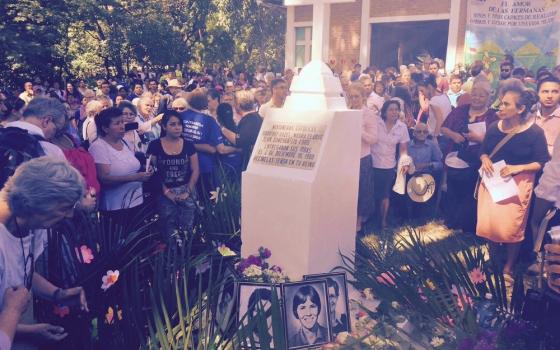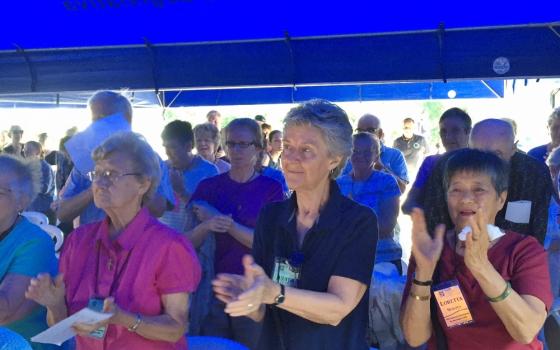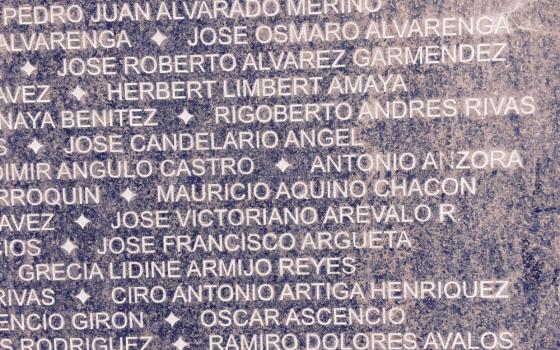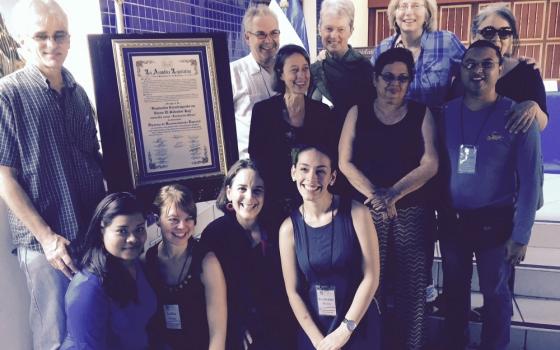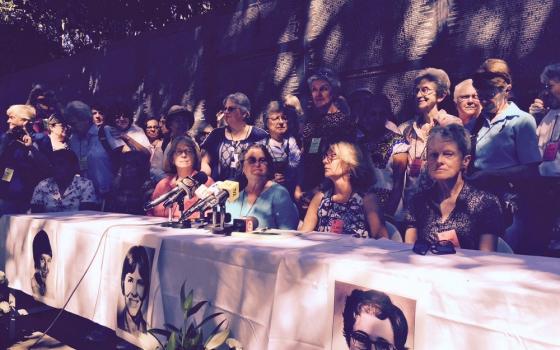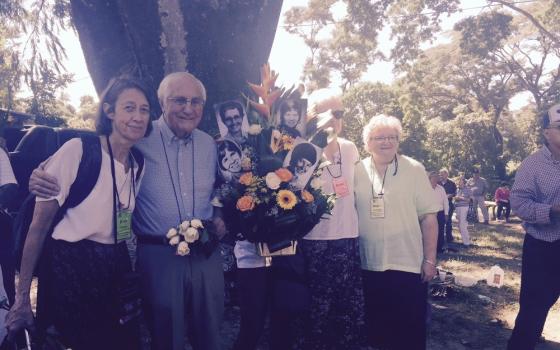"El Salvador is such a beautiful country! Where else would you find roses in December?"
-Jean Donovan, lay missioner (1953-1980)
Thirty five years ago, four US missionary women — Ita Ford, Maura Clarke, Dorothy Kazel and Jean Donovan — were raped and killed by the Salvadoran National Guard for accompanying the people of El Salvador, especially the poor, and for questioning U.S. military aid and foreign policy.
This month, a delegation of 116 women religious from 35 different congregations, the daughter of the U.S. Ambassador Robert White, relatives of the sisters and Jean Donovan, and other lay and ecumenical leaders traveled to El Salvador to commemorate the 35th anniversary of these martyrs. The delegation, co-sponsored by SHARE El Salvador foundation and the Leadership Conference of Women Religious visited the site of the murders, met with Salvadoran leaders and walked in accompaniment with the people of El Salvador as they cry out for action.
Our mission: to celebrate the lives and ministry of our sisters, to renew our commitment to the people of El Salvador and to call for an investigation into their deaths as a vital step toward ending the culture of violence and impunity that plagues El Salvador to this day.
Why the sisters' case matters today
In 1992, 12 years after the deaths of Ita, Maura, Dorothy and Jean, the Salvadoran Civil War officially ended with the signing of the Peace Accords at Chapultepec, Mexico. But none of the intellectual authors of crimes against humanity has been brought to justice in El Salvador.
In 1993, the right wing ARENA government adopted an Amnesty Law.
In 1998, after 17 years of silence, all four of the former national guardsmen convicted of killing the church women admitted for the first time that they acted only after receiving "orders from above."
In 2002 General Vides-Cassanova, along with former Minister of Defense Jose Guillermo Garcia, were found responsible by a Florida jury in a federal civil case for the brutal torture of three Salvadorans, and in 2009 the US Department of Homeland Security initiated removal proceedings against both men for "participating and assisting the torture and assassination of thousands of victims, including the four North American church women." Vides-Cassanova was deported to El Salvador in 2015.
Prosecuting the intellectual authors of the high-profile case of the sisters not only grants a measure of resolution to those who knew and loved them, but it is a critical step toward breaking the cycle of violence and impunity that plagues El Salvador today. It is a first step toward restorative justice that makes possible the birthing of a culture of peace and reconciliation.
Accompaniment as gift
Our modest accompaniment was in the tradition of Ita, Maura, Dorothy and Jean, and, like them, we received much more than we gave.
In the 1970s, a popular movement was growing. The people were organizing. Campesinos formed unions, demanding just wages and working conditions, and above all, respect for their human dignity. Electrical workers, teachers, students, hospital workers, and many more coalesced in a broad movement demanding economic and social justice. The "church of the poor" was blossoming in the aftermath of Vatican II and the meeting of Latin American Bishops in Medellin where they declared the "preferential option for the poor," God's intervention in history and the gospel imperative to build love and justice on this earth, Madre Tierra.
We are at the threshold of an historic epoch in our continent, full of the longing for full emancipation, for liberation from bondage, for personal growth and collective integration. We recognize the first signs of a painful birthing of a new civilization. We must not fail to interpret this huge effort for a rapid transformation and development as an evident sign of the Spirit which drives the history of men {and women} to fulfil their vocation. (Medellín documents)
Pastoral teams invited the people to read the signs of the times and examine ways to act to build the Kingdom of God in this lifetime. They explored social sin and structural violence, including the violence of poverty and exclusion. They imagined a society where love and justice flourish and all are sisters and brothers. It was a message of liberation that resonated across Latin American.
Those in power viewed the popular church as an accomplice to the growing social and political revolutionary movements in the region calling for fundamental change. In the context of the Cold War, conservatives in the United States considered the emerging movement as a threat to U.S. hegemony and national security interests. They instituted a program of systematic repression in the effort to thwart the budding movement. Trained at the U.S. School of the Americas and aided by paramilitaries (Organización Democrática Nacionalista , ORDEN), the Salvadoran Security Force unleashed a military campaign of scorched earth in the countryside and targeted assassinations in the cities. Their primary task: to instill fear and destroy the movement. An armed opposition emerged, which would later become the Farabundo Marti National Liberation Front (FMLN).
By early 1980, thousands were being killed and displaced from their lands by military and paramilitary forces. Thousands more fled to neighboring countries and the United States in search of refuge. Salvadoran Archbishop Oscar Romero, the voice of the voiceless, condemned the violence. The beloved archbishop, himself, was assassinated while saying Mass at the Chapel of the Divine Providence, a month after appealing to the United States to halt military aid and a day after calling upon the members of the Armed Forces to "stop the repression!"
Priests, sisters, delegates of the word, trade unionists, teachers, and all who challenged the government were at risk. But Ita, Maura, Dorothy and Jean chose to remain. Our sisters understood their task to be no more or less than the biblical invocation: "This is what the Lord asks of you: only this, to act justly, to love tenderly, and to walk humbly with your God." (Micah 6:8) Much like Oscar Romero, Fr. Rutilio Grande and the countless others, they paid the ultimate cost of discipleship with their lives.
The memorial wall: A monument to memory, truth and healing
One of our first stops on this 35th anniversary was the Memorial Wall in Cuscatlan Park in downtown San Salvador. The memorial honors the 75,000 civilians killed during the war, including the four women, and the 10,000 people who were "disappeared." Thirty thousand of their names are etched on a gleaming, black granite wall along with a dedication that reads: "This memorial is a gathering place, so that we never forget them, to honor their memory, to return to them dignity, to not permit the horror to be repeated and to lay the basis for a culture of peace and authentic reconciliation. A space for hope, to continue dreaming and building a more just, humane and equitable society."
At the memorial wall, the SHARE/LCWR delegation joined Salvadoran human rights organizations and the Ombudsman for Human Rights of El Salvador, David Morales and called upon the government of El Salvador and the attorney general to investigate their murders and hold accountable General Eugenio Vides Cassanvoa.
"The sisters were martyrs. Sub-sergeant Luis Colindres coordinated with local law enforcement to perpetrate the crime. The two governmental investigations were a farce, and under the direction of General Eugenio Vides Cassanova. The case must be investigated," said Morales.
Mercy Sister and former SHARE President Diane Clyne, along with Claire White, the daughter of the late Ambassador Robert White and SHARE Executive Director, Jose Artiga, reiterated the imperative to investigate the case and break the cycle of impunity as a vital prerequisite to achieving peace in El Salvador.
Madre Guadalupe, the co-founder of the Mothers of the Disappeared declared, "It is time to end the impunity, for only through truth, justice and reparations can we have peace and reconciliation." Only by addressing past crimes, can we hope to break the cycle of violence that continues to plague El Salvador. It was headline news.
Holy ground
On December 2, we gathered at the site where the sisters' were buried to celebrate Eucharist, share the story of their martyrdom, and recommit to continue the work. Pilgrims from all over the world attend to remember the sisters' lives and legacy.
This year, our delegation retraced the route from the airport road that took the four women to their deaths. When we turned off the main highway, we rode in silence and then disembarked from our buses to process with the people to the site where Ita, Maura, Dorothy and Jean's bodies were unearthed. Hundreds gathered under the blazing sun.
A small chapel, a white memorial cross, and a grove of guanacaste trees circle the area. We celebrated Mass, shared the stories of their lives and ministry, and promised to continue their work accompanying the people of El Salvador. We cried and laughed, sang and prayed. We gave thanks. We laid large wreaths of roses, other flowers and palm branches at the foot of the memorial.
And we remembered.
"They were holy women. I was honored to work with these women for six months, side by side," declared Jose Angel Maria, an old man who stood erect as he told the story. "I met Maura and Ita first. They worked with us, the poor. . . . When people were forced to flee the bombing, they accompanied us. . . . Maura would offer everyone water first, saving only a little for herself." When the military cut off food supplies to entire communities, the sisters braved road blocks to bring them corn and beans. When parents were killed, Dorothy and Jean brought the orphaned children to safety.
"I met Dorothy in 1974. . . . I was the fruit they left behind," said Candelaria Garcia. "She invited us to a meeting. Dorothy made "pan de chocolate [chocolate bread]; Jean was a beautiful girl with dreams. Their death was a cry from God saying, 'Stop the war.' It was a time of war and terror, but we had them. They taught me how to feel and see all as my own sisters and brothers."
Guadalupe Calderon shared, "The sisters showed us the way to find God in the poor — the orphaned, the marginalized, and the poorest of the poor. Their martyrdom showed us how important their work was."
Earlier, at the Community of New Hope (Nueva Esperanza) in the Bajo Lempa, Sister Naomi remembered, "Their love was concrete. They supported the people persecuted by the military. They were consolation in the midst of anguish, for mothers who lost their children, like Veronica who wiped the face of Jesus. . . . They were prophets who denounced the U.S government's military aid which resulted in the death of the Salvadoran people. Their lives were gospel lives."
David Rodriguez reflected, "Many years ago other Christians arrived and wiped out our land, our tradition, our language, our lives. Then came the sisters. . . . We have been blessed by these Christians who recognized our dignity as people, ate our food, accompanied us as we demanded our rights and struggled for liberation, to build the Kingdom of God.
The last witness: Memory, truth telling, healing and hope
In ancient Mayan tradition, the guanacaste tree is a sacred tree with large ears.
The night of December 2, 1980, in the same year as the martyrdom of Monsenor Oscar Arnulfo Romero, the guanacaste tree listened, the final witness to the martyrdom of four beautiful gospel women who dedicated their lives to the poor of El Salvador.
The tree's tall figure cut into the beautiful dark night as the soldiers dragged Ita, Maura, Dorothy and Jean from a vehicle, violated them and shot them dead.
The guanacaste soaked up the women's cries, their tears, their final prayers and their blood. They listened to the sisters' spirits. They listened, too, to the words and the hearts of the five guardsmen who executed the plan. They smelled the smoke of the torched vehicle, which would be discovered up the road by villagers. They gathered the broken hearts of the communities with whom the sisters had walked, of Frs. Paul Schindler and John Spain who identified the bodies at the grave site. They shored up the U.S. Ambassador, Robert White, who stood in disbelief as they unearthed the broken bodies and who declared we would get to the bottom of this. They cried out, "No!" when the high command and U.S. Secretary of State Alexander Haig and U.N. Secretary Jeanne Kirkpatrick claimed the sisters were "subversive" and must have run a military road block to provoke such an atrocity.
The guanacaste trees stand firm, nourished by the tears and blood of a people who have moved hearts and who continue to move the world and to inspire international solidarity with the persecuted of El Salvador.
Today, 35 years later, we remember.
We remember the love of the people and the struggle for justice.
The families of all the martyrs remember. 116 sisters from 35 religious congregations remember. The daughter of the ambassador remembers. Those of us who accompanied the persecuted people and churches of El Salvador remember. Even General Vides Cassanova remembers.
We seek truth and justice so as to break the impunity and violence that continues to wreak havoc in El Salvador and in our world; a violence that creates intractable unemployment, extortion, the lack of opportunity and forced migration. A violence that separates families and compels mothers and children to brave the treacherous journey north.
For without truth there can be no justice. Without justice, there can be no reconciliation. Without reconciliation, there can be no peace. And the bitter fruit of war, poverty and violence will continue to lay siege to our people.
Like stars in the night sky, Ita, Maura, Dorothy and Jean continue to shine. They invite us to accompany the people, to share in the cross and light the way to a new day when all will know love and justice.
Only then will we be free.
[Eileen Purcell was a co-founder of the sanctuary movement and the first executive director of the SHARE Foundation during the war years in El Salvador. In 2013 she received an honorary doctorate from the Jesuit University of San Francisco in recognition of her ongoing defense of human rights in El Salvador and labor and immigrant rights in the United States.]
Related - US women religious look back on El Salvador martyrs, ahead to delegation to mark 35th anniversary and 1980-2015: Memory of El Salvador's church martyrs lives on
